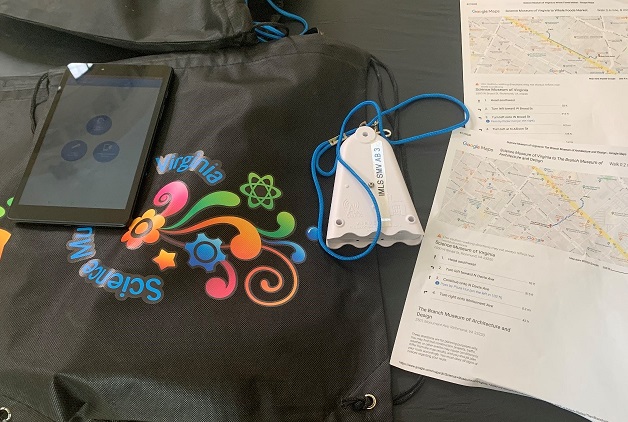Governor Northam, Mayor Stoney announce sustainable biotech firm to expand operations in Richmond, creating 250 new jobs
One of the draft strategies in the RVAgreen 2050 equitable climate action and resilience action plan is to "make Richmond a leader in attracting companies that promote a circular economy through creative and innovative solutions to waste reduction and recovery.” What do you think? Provide your input by April 30!
Read more about the announcement of new jobs in Richmond in sustainable biotech below!
Media Advisory
Tuesday, April 20, 2021
Contact: Devin Wood
Cell: 804-484-4800
[email protected]
Governor Northam, Mayor Stoney announce sustainable biotech firm to expand operations in Richmond, creating 250 new jobs
Grenova Inc. to invest $10.6 million to increase production of pipette tip cleaning, washing and sterilizing machines
Richmond, VA — Governor Ralph Northam today announced that Grenova Inc., a Virginia-based sustainable biotech firm that designs, develops, and manufactures devices that wash and sterilize contaminated pipette tips for reuse, will invest $10.6 million to expand in the City of Richmond. The company will relocate its operations from Manchester to a larger facility in Scott’s Addition and increase capacity with new production lines in response to the shortage of pipette tips used for COVID-19 testing. Governor Northam joined company leaders at the site of Grenova’s future location at 1900 Ellen Road to celebrate the project, which will add 250 new jobs over the next three years.
“We are thrilled to celebrate this homegrown sustainable biotech firm expanding and adding to its workforce in Richmond,” said Governor Northam. “It is remarkable to see Virginia’s innovative life sciences businesses quickly adapt and respond to critical needs as we fight this pandemic. Grenova is an emerging industry leader that has achieved exponential growth in a short time, and I applaud the company for leveraging its technology and expertise to address a global shortage and reduce environmental waste.”
Founded in Richmond in 2014, Grenova’s mission is to help lower costs and reduce biohazard waste by delivering groundbreaking approaches in dealing with plastic consumables. The company’s product, Tipnovus™ enables laboratories to wash and sanitize pipette tips for reuse numerous times, cutting associated consumable costs by up to 96 percent. Ten pipette tips are used to fully conduct one COVID-19 test, resulting in a worldwide shortage of the plastic consumable. Grenova’s technology allows healthcare systems to safely wash and reuse the pipette tips used for testing, which has helped to end pipette tip shortages and improve access to COVID-19 testing while making labs more environmentally friendly. Due to demand for Grenova’s products, the company has quadrupled in size in the last year. Grenova sells products from its Richmond facility to laboratories and distributors across the United States, as well as in Europe and Asia.
“This expansion project is an important win that will create 250 new, high-quality jobs and help improve Richmond’s standing as a life sciences hub,” said Secretary of Commerce and Trade Brian Ball. “Grenova is a great success story for the Commonwealth, and we are confident the region will continue to provide the business climate and workforce needed for years to come.”
“Our growth is a sign that the world is ready to rethink, reimagine, and reinvent the way plastic consumables like pipette tips are washed and reused within the life sciences industry and beyond,” said Ali Safavi, Founder and CEO of Grenova. “We’re proud to make our bold solution possible from our expanded headquarters in Richmond thanks to the Commonwealth’s thriving ecosystem of world-class talent, resources, and infrastructure.”
The Virginia Economic Development Partnership worked with the City of Richmond to secure the project for the Commonwealth. Grenova Inc. is eligible to receive state benefits from the Virginia Enterprise Zone Program, administered by the Virginia Department of Housing and Community Development, and funding and services to support the company’s employee recruitment and training activities will be provided through the Virginia Jobs Investment Program.
“Grenova’s sustainable solution for lab testing consumable products is a premier example of how great ideas and ingenuity flourish in the City of Richmond,” said Mayor Levar Stoney. “The City is thankful for the company’s capital investment and new job creation. Grenova’s new facility in Scott’s Addition demonstrates that entrepreneurial and life science ecosystems in Richmond are strong and continue to have a far-reaching impact.”
“The expansion of Grenova Inc. is wonderful news for Richmond,” said Congressman Donald McEachin. “Creating jobs and reducing biohazardous waste are two critical goals that are good for Richmond and for the Commonwealth. Once again, Virginia leads the way.”
“I am so pleased to see Grenova’s expansion to its new and larger facility in Scott’s Addition,” said Senator Ghazala Hashmi. “Grenova’s introduction of innovative technologies helps to address the global shortage of pipette tips during this pandemic and also highlights how we can reduce biohazard waste. This expansion will bring exciting new jobs opportunities and further talent development in Richmond.”
“I am happy to hear that Grenova Inc. will be expanding its operations in the City of Richmond,” said Delegate Jeffrey Bourne. “The work that the company is doing to reuse pipette tips is an essential cog in the machine that is our COVID-19 response. Grenova’s presence in Richmond continues to provide important jobs as well as contributes to Richmond’s status as a place for innovation and growth.”









